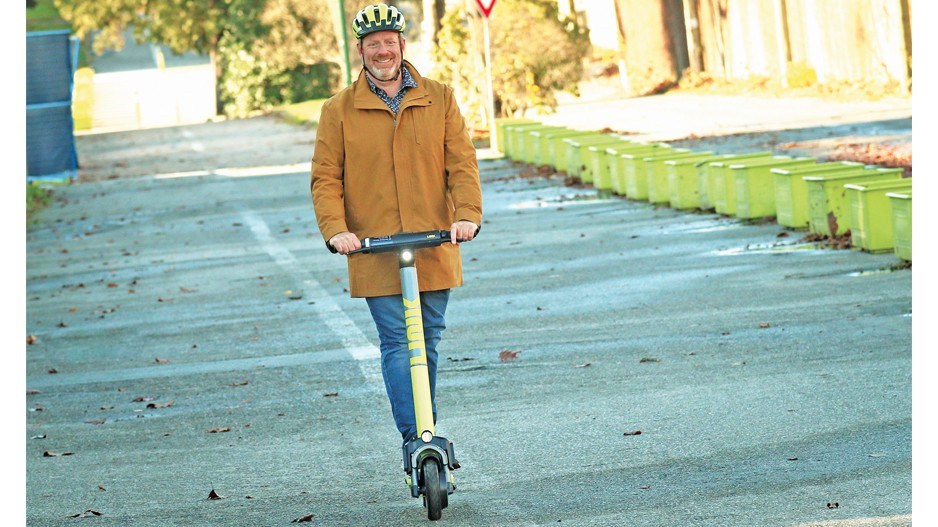The immediate aftermath of the pandemic left Metro Vancouver’s transit system feeling less like a can of sardines and more like a local bar on a weeknight following yet another Canucks loss.
At the height of lockdown, and as throngs of employees began working from home, TransLink ridership plunged by as much as 83%. Demand for first-mile/last-mile solutions took a major hit in the region as a result, stymieing efforts to connect commuters between transit hubs and their destinations.
But with this year’s mass vaccination campaign and the further opening of the economy, operators within the first-mile/last-mile space are renewing efforts to fill in the gaps for commuters.
Among those operators is Superpedestrian Inc., the Massachusetts Institute of Technology spinoff behind the shared-use Link e-scooter service. The company is known for developing geofencing technology to keep its shared e-scooters within boundaries designated by local jurisdictions.
For instance, the e-scooters might be able to cruise along the Seawall but could be programmed to slow down and not enter Stanley Park. That is, if such shared e-scooter services were approved for use in the City of Vancouver.
Just ahead of the pandemic last year, the province OK’d the launch of pilot projects for e-scooters and similar modes of transportation in a bid to reduce traffic and address ongoing first-mile/last-mile challenges for commuters.
While Vancouver has allowed the personal use of devices such as e-scooters and e-bikes since this past summer, shared services offered by private companies are still off the table. Meanwhile, e-bike provider Lime (Neutron Holdings Inc.) was able to deploy a fleet of 200 electric-assisted bikes on the streets of all three North Shore municipalities this past summer.
Superpedestrian is still intent on launching its services in Vancouver proper, according to Dave Holzer, who leads the company’s government partnerships in Canada.
“Vancouver is an excellent market for micromobility,” he said, referring to the city’s extensive network of bike lanes.
While Holzer described the city’s approach as “pretty slow and pragmatic,” he said that it’s not necessarily a bad thing.
Much like how Superpedestrian is a second-mover shared e-scooter company, following the likes of Lime, cities like Vancouver can learn a lot from observing how these services have operated in other jurisdictions.
In Seattle and San Francisco, for example, complaints mounted as Lime e-scooters often piled up on sidewalks when not in use, blocking paths for pedestrians.
Holzer said his company has not been asked to leave any of the jurisdictions in which it operates and has had conversations with TransLink about providing services at transit hubs.
“They’re very interested in this because they see it as really helping get people to major transit hubs and from their homes and from spots that might be just a little bit wayward of some of the major transit hubs,” said Holzer.
“I chuckled because [Superpedestrian’s Link] launch was slated for 2020, and then the pandemic hit, but we pressed on and now have grown to about 50 cities and eight countries.”
TransLink CEO Kevin Quinn, meanwhile, said there are no immediate partnerships in the works for first-mile/last-mile options. But he said the regional transit authority is working on better integrating how people move around the region.
“Under our current Compass card system we don’t have the ability for someone, on the same integrated and personalized fare-payment system, to both get on a scooter, hop on the SkyTrain or a bus, [and] hop on BC Ferries,” he told BIV.
“We need to have a regionally integrated fare-payment system. So it’s great to have these multi-modal options all over the place, but right now they’re just far too siloed. And I think TransLink has a real responsibility to pull all these pieces together into one fully integrated framework.”
Meanwhile, the reopening of the global economy amid the pandemic has also ratcheted up demand for facilitating first-mile/last-mile services developed in Vancouver.
“It’s been a pretty wild time for us,” said Josh Andrews, chief operating officer of Spare Labs Inc.
His firm, which closed an $18-million funding round earlier this week, specializes in software that makes it easier for cities and transit agencies to manage transportation networks.
Its transportation-as-a-service (TaaS) platform allows commuters to punch in their location and find various travel options to get to their final destination (in some cities, buses may even be rerouted in real time depending on demand instead of travelling along fixed routes on fixed schedules).
Amid sharp declines in ridership, “we have seen a lot of cities start to look at ways they can optimize transportation services,” Andrews said, adding that some client cities still face ridership rates 50% that of pre-pandemic levels.
Among the more than 50 cities in which Spare’s made-in-B.C. technology is being used, the City of Dallas plans in the coming weeks to at least double the number of microtransit zones Spare helps manage. Microtransit zones represent the gap between a starting point or end destination (such as a home or workplace) and a major transit hub (a SkyTrain station or bus loop, for example).
In the case of Dallas, the doubling of microtransit zones means greatly reducing the number of fixed-route buses and replacing them with on-demand options that Spare’s platform can help facilitate for passengers.
Andrews said it represents a significant change for a city the size of Dallas.
“We’ve seen a pretty massive business growth for ourselves over the last year and a half.” Andrews added that Spare will double its head count of just over 50 people within the next year to manage the increased demand.
Spare has also had conversations with TransLink and BC Transit about introducing its technology to those agencies.
“We’ve seen a really strong surge in demand for this type of service because so many different cities and municipalities are evaluating their current needs when it comes to transit,” Andrews said.




